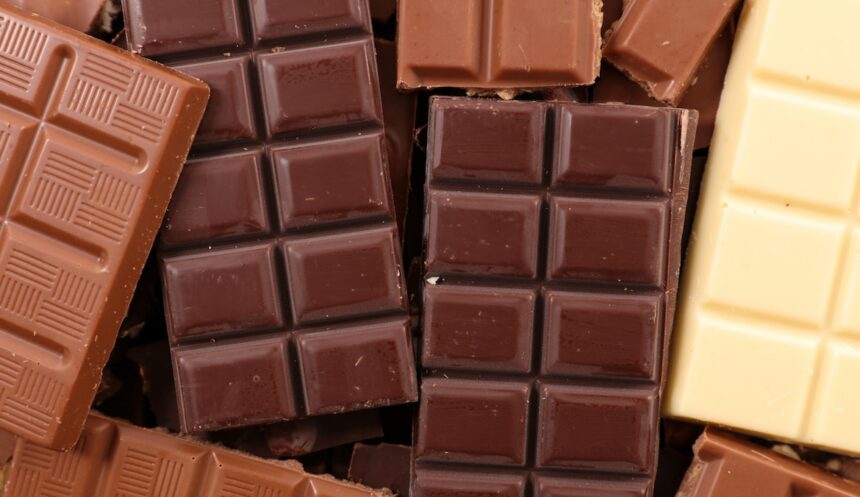Whether you favor a beneficiant slice of double fudge cake or at all times hold a sweet bar readily available, chocolate is undeniably certainly one of life’s best pleasures—significantly to cap off a terrific dinner. Nevertheless, contemplating that chocolate has caffeine in it, is your late-night deal with secretly sabotaging your sleep?
That’s proper: It’s not simply espresso, black and inexperienced tea, and vitality drinks that would hold you abuzz lengthy after your head hits the pillow. Meals with caffeine exist as effectively, with chocolate amongst them. However is chocolate a genuinely important supply of the stimulant to the place it may hold you from falling asleep or having different signs like jitters? Hold studying to see what the consultants should say.
Does chocolate include caffeine or not?
Sure, most chocolate has caffeine in it. However the quantity varies primarily based on the cacao and cocoa proportion, how the chocolate was processed, and different components, says Brooklyn–primarily based dietitian Maddie Pasquariello, RDN.
“In milk chocolate, there are about 20 milligrams of caffeine per 100 grams,” Pasquariello says. “In darkish chocolate, the extent can range a bit extra, [ranging] anyplace from 50 milligrams to 150 milligrams per 100 grams.”
To place this into perspective, Pasquariello gives the instance of a typical serving dimension of two squares (round 25 grams) of a chocolate bar. “For those who’re consuming milk chocolate, the caffeine content material in a serving is roughly 5 milligrams—and for darkish chocolate, anyplace from 12 milligrams to 38 milligrams,” she explains. In the meantime, a slice of chocolate cake with chocolate frosting will pack roughly 4 to eight milligrams of the stuff, per the USDA.
Contemplating that the Meals and Drug Administration (FDA) recommends folks devour not more than 400 milligrams of caffeine per day, a sq. or two of chocolate is mostly a drop within the bucket.
Curiously, chocolate additionally packs theobromine, a gentle stimulant carefully associated to caffeine. In response to a 2015 overview1 within the journal Frontiers in Pharmacology, the dynamic duo has the potential to get your buzz on and is additionally liable for the pleasure you get from consuming it.
Which chocolate has probably the most caffeine?
Typically talking, the darker your chocolate deal with is, the extra caffeinated will probably be. “Darkish chocolate will usually have no less than 3 times the quantity of caffeine as milk chocolate,” notes Pasquariello.
White chocolate, then again, doesn’t have caffeine because it makes use of cocoa butter relatively than cocoa solids, the latter of which provide caffeine in addition to different useful compounds together with magnesium, iron, and antioxidants.
Milk chocolate falls within the center—lower than darkish chocolate, however greater than white chocolate—as a result of it incorporates some cocoa solids.
Caffeine in chocolate vs. espresso and tea
The quantity of caffeine in chocolate varies primarily based on a spread of things, and the identical goes for the commonest sippable sources of the stimulant. However basically, there’s usually much less caffeine in chocolate than in most different caffeine sources like espresso and tea.
Pasquariello shares ballpark estimates for the way a lot caffeine you may count on in fashionable caffeinated drinks:
“The extent [of caffeine] in snack bars and different meals gadgets will rely on the model, kind, and the way a lot you devour,” Pasquariello reiterates. “Most caffeinated snack bars include round 60 to 80 milligrams caffeine per serving,” so that you’re prone to really feel perked up when you eat it multi function go.
You’ll be able to hone in on the exact content material of your most popular caffeinated drink or meals—branded goodies, snacks, and different sweets included—with this detailed caffeine chart by the Middle for Science within the Public Curiosity.
Are you able to eat chocolate when you can’t have caffeine?
Sure, you probably can nonetheless get pleasure from small quantities of chocolate when you don’t in any other case usually devour caffeine—except you’re actually delicate to it. That’s as a result of there’s a comparatively small quantity of caffeine in chocolate per serving (particularly milk and white goodies) in comparison with extra widespread sources of like tea and chocolate.
“For those who eat quite a lot of servings of darkish chocolate, it is attainable you may really feel a bit wired, particularly when you’re caffeine-sensitive,” says Pasquariello. “However when you’re having a sq. or two of milk chocolate or one thing with low cacao content material, it is extremely unlikely you will expertise noticeable results of caffeine.”
In fact, each physique is totally different, so it’s most essential to be aware of how your chocolate consumption impacts you. As an example, when you repeatedly get pleasure from chocolate earlier than mattress but have bother catching ZZZ’s (and there’s nothing else to elucidate the difficulty), it might be useful to regulate your serving dimension or timing. Then again, when you get pleasure from a chocolatey deal with nightly and might nonetheless relaxation effectively, you’re in a *candy* spot to get pleasure from your treats as you see match.
Caffeine issues apart, Pasquariello believes that chocolate is a pleasure that may accommodate any dietary routine. “As somebody who has a bit deal with or dessert after practically each meal, I wholeheartedly imagine that chocolate of any variety can match right into a nutritious diet,” she says. (Can I get an amen?)
What sort of chocolate you hunt down is dependent upon your style preferences, however she says she usually likes darker chocolate for extra taste with out as a lot added sugar. “However finally, it is also about not depriving ourselves of meals we love.” Notably when these meals also can make it easier to stay longer (as is the case with chocolate).
Effectively+Good articles reference scientific, dependable, latest, strong research to again up the knowledge we share. You’ll be able to belief us alongside your wellness journey.
- Martínez-Pinilla, Eva et al. “The relevance of theobromine for the useful results of cocoa consumption.” Frontiers in pharmacology vol. 6 30. 20 Feb. 2015, doi:10.3389/fphar.2015.00030












